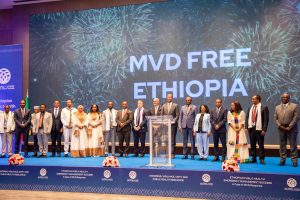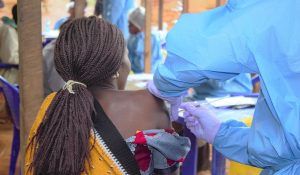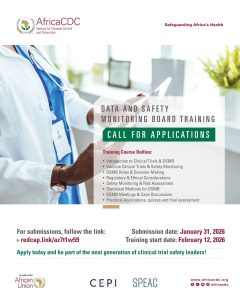A year on, the ongoing mpox outbreak now affects 26 countries across Africa, up from seven initially. Containing the outbreak remains a challenge, complicated by the disease’s four clades and several sub-strains, the latest of which was only identified earlier this year.
For example, Clade I is typically associated with higher mortality rates and more severe illness compared to Clade II. Clade IIB is sexually transmissible and is driving the outbreak in the eastern Democratic Republic of the Congo and Uganda.
Thus, timely and comprehensive knowledge is proving to be essential in identifying and mounting effective responses to the mpox outbreak.
A new initiative, soon to be launched by the Africa Centres for Disease Control and Prevention (Africa CDC), is set to enhance the management of knowledge on health issues and emerging diseases like mpox. This marks a significant step in transforming the continent’s public health landscape.
The knowledge management initiative will ensure that health knowledge is readily available, accessible, and translated into policies and practices to prevent and control diseases and strengthen the health system in Africa.
Dr Nebiyu Dereje, Head of Division, Knowledge Management, and Editor-in-Chief of the Journal of Public Health in Africa (JPHIA), emphasised that the knowledge management system is critical to facilitating health knowledge generation and exchange among AU Member States, ensuring continental health security.
He further highlighted that the knowledge management system will facilitate pandemic preparedness and response efforts among Member States. “Knowledge generated from an outbreak response in a country will critically support the preparedness and response efforts for a similar outbreak in other countries,” said Dr Nebiyu.
The much-anticipated Africa Health Knowledge Management Portal has been designed as a dynamic and collaborative platform. It will serve as a central hub for health data, knowledge, research, and policy insights. This will enable Africa CDC, its five Regional Coordinating Centres (RCCs), and African Union (AU) Member States to generate and access knowledge, and to transform resources into policy and public health action.
The portal is a flagship component of Africa CDC’s broader knowledge management initiative. It aims to close Africa’s persistent gap in global knowledge production and usage, currently described as suboptimal, through innovative and scalable solutions.
“This portal is not just a knowledge repository site. It’s a smart system built to catalyse evidence-based decision-making, empower national health systems, and boost regional knowledge exchange and cooperation,” said Dr Mosoka Papa Fallah, Acting Director of Science and Innovation at Africa CDC.
The knowledge management hub will facilitate the availability of key public health resources, such as data, information, documents, and knowledge relevant to the needs of Member States. It will serve as a one-stop shop through a collaborative approach.
The portal incorporates cutting-edge features, including AI-powered systems that enable multilingual translation, intelligent search tools, an interactive chatbot, and real-time document comparison. These are all designed to make public health information easier to find, understand, and act upon.
Users, from national policymakers to frontline health workers, will benefit from personalised content recommendations and a mobile-friendly interface that brings knowledge to their fingertips.
The portal is set to be established at three levels: continental, regional, and Member State levels. It will be hosted by Africa CDC and will enable knowledge exchange at the continental level across all 55 Member States and other relevant stakeholders.
A regional knowledge management portal will be hosted by each RCC. A series of Member State knowledge management portals will be hosted by individual AU Member States. However, the system will be structured to integrate with existing national health information systems, allowing countries to either host their own portals or link directly with the continental platform.
Built with support from the Rockefeller Foundation and the Mastercard Foundation, the portal reflects Africa CDC’s vision of pivoting its RCCs towards an “Africa CDC without walls”. This refers to a continent-wide network where knowledge flows freely across borders.
Pilot implementation is already underway in some Member States. These pilots showcase how countries can customise the platform to meet local needs while contributing to continental knowledge sharing.
Africa CDC will also support Member States in training dedicated knowledge managers, establishing national knowledge management teams, and building governance frameworks that ensure sustainability.
What truly sets the portal apart is its commitment to fostering a culture of knowledge sharing. Through innovations such as weekly Knowledge Hours, Knowledge Cafés, and curated Communities of Practice, Africa CDC aims to foster real-time exchange among public health practitioners, policymakers, and researchers.
“The knowledge exists. The challenge has always been access, translation, and application,” said Dr Mosoka. “With this endeavour, we are bridging that gap.”
With Africa being the continent most affected by disease outbreaks and increasing demands on its health system, the knowledge management portal provides a timely and strategic response. It is grounded in digital transformation, local ownership, and collaboration.
The portal will play a crucial role in supporting AU Member States as they strengthen health systems, respond to emergencies, and align with Africa CDC’s New Public Health Order.
For more information and access to the portal prototype, visit https://khub.africacdc.org







